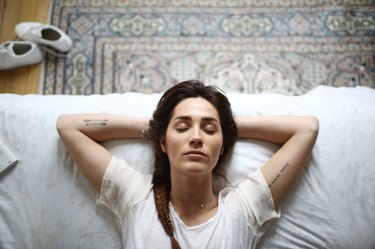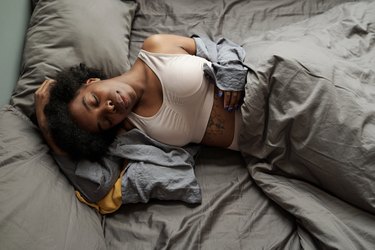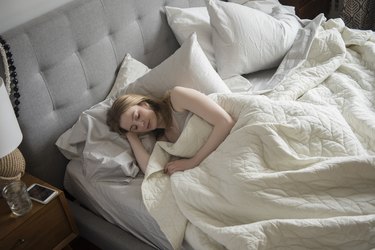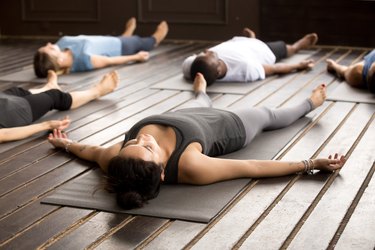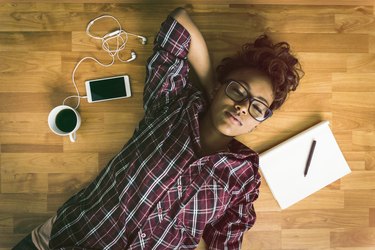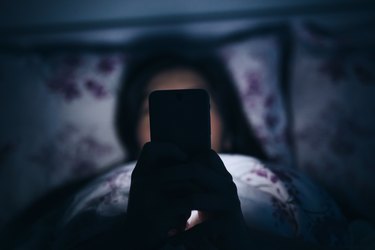
You're dragging through the day, counting down the hours until you can climb into bed and finally get some rest. But when the time actually comes and your head hits the pillow — bam, you're hit with a second wind and are now wide awake.
"It's very common for people to feel tired, then wired, when it's finally time to wind down," says Nicole Avena, PhD, associate professor of neuroscience at the Icahn School of Medicine at Mount Sinai in New York. But it can also be highly frustrating — and more importantly, a sign that something about your sleep routine is way, way off.
Video of the Day
Video of the Day
Here's a look at some of the most likely reasons why you're tired but can't sleep once you get into bed. Plus, what you can do to fall asleep more easily and get the rest you need.
1. Your Brain Thinks Bed = Awake
You know intellectually that your bed is a space for sleep and sex. But if it's also home to additional activities, your brain might think otherwise. The result is learned insomnia or learned arousal, where the brain associates getting into bed with becoming more alert instead of less.
"If you're constantly working, watching TV or doing other 'awake' activities in bed, the body learns to be awake in bed," says Morgan Levy, PhD, a psychologist based in Boca Raton, Florida. That can leave you tossing and turning for hours, worrying about not getting enough sleep, and waking up tired.
Fix it: Treating learned arousal involves re-teaching your brain that bed is only a space for sleep. The first step is to stop doing 'awake' activities there. "You must retrain your mind and body to recognize sleep cues, like a dark room and laying in your bed," Avena says.
Related Reading
2. You Drank Too Much Caffeine
It's no big secret that downing a coffee or an energy drink right before bed can wind you up (and maybe cause other problems). But an afternoon pick-me-up might have a similar effect.
Consuming 400 milligrams of caffeine (roughly the amount in 16 ounces of coffee) six hours before bedtime has the potential to slash your snooze time by an hour, found a November 2013 study in the Journal of Clinical Sleep Medicine.
If you're particularly sensitive, even a 7:00 a.m. caffeine hit could make it harder to nod off at night, per a December 2018 Risk Management and Healthcare Policy study.
Fix it: Moving your caffeine intake earlier or cutting back altogether can make it easier to fall asleep. Harvard Medical School recommends avoiding the stuff for at least four to six hours before bedtime.
3. You're Revved Up From Your Device
A quick email or social media check before turning in for the night might not seem like a big deal. But using electronic devices within 30 minutes of bedtime is associated with significantly poorer sleep quality — regardless of factors like caffeine or alcohol intake, exercise or depression, according to a September 2021 study in Healthcare.
That's thanks to the glow from your screen. The blue light from tablets, cell phones and computers can delay the release of the sleep-promoting hormone melatonin, according to the American Sleep Association. This, in turn, can throw off your body's internal clock and make it harder to nod off at your normal time.
What's more, the content you're consuming (in other words, the show you're watching or TikTok videos you're scrolling through) could be stimulating enough that it doesn't allow you to fall asleep as quickly as you otherwise would.
Fix it: You'll reap the biggest snooze-inducing benefits by putting away your device at least an hour before bedtime. But even 30 minutes before bedtime may be helpful, the Cleveland Clinic notes.
4. You're Anxious or Depressed
There's a strong link between mental health problems and sleep troubles. While anxiety or depression can leave you feeling fatigued or sluggish, it's also common to experience racing thoughts or being unable to quiet your mind, which can make it harder to nod off.
"With anxiety, these thoughts may be related to future concerns, and with depression they are related to past regrets," Levy says.
Fix it: Sometimes buckling down on your sleep hygiene is enough to make a difference, but that's not always the case. "At that point, I would recommend reaching out to a mental health professional for help," says Levy.
5. You Have a Sleep Disorder
Insomnia isn't the only sleep problem that can make it harder to doze off. Conditions like restless legs syndrome and sleep apnea can also interfere with your ability to fall asleep and get the rest you need, according to the Cleveland Clinic.
Fix it: Pinpointing the problem usually requires the help of your doctor, who can order a sleep analysis test.
"The test can identify any issues with brain waves or breathing through the night [to determine the best course of treatment]," Avena says.
How to Get the Sleep You Need
Adopting basic healthy sleep habits like keeping your room dark and limiting caffeine intake can go a long way toward helping you doze off. But sometimes they aren't enough. When that's the case, consider trying one of these next-level strategies to nod off faster:
1. Melatonin Supplements
The body's levels of the sleep-promoting hormone melatonin rise naturally before bedtime. But sometimes, getting an extra boost in the form of a melatonin supplement can help the brain wind down, Avena notes. She recommends Vitafusion Melatonin Gummy Vitamins ($10.69, Amazon.com).
2. Relaxation Techniques
Relaxation techniques are aimed at reducing tension in the body and slowing down your thoughts to help you fall asleep more easily. "They take some time and practice to start noticing long-term effects, but with consistent practice they can help people feel very calm," Levy says.
She recommends deep breathing while focusing on your senses. While lying in bed, take notice of the softness of the sheets on your skin, the darkness of the room, the humming of the air conditioner or fan, and even things like the taste of lingering toothpaste in your mouth or the smell of your pillow. "That sort of focus helps to put the body in a more relaxed state," she says.
3. Stimulus Control
This psychology tactic can help manage anxiety around falling asleep, specifically for problems like learned arousal. If the act of lying in bed makes you feel more awake or worried, take steps to start sending your brain some new cues.
Don't do anything in your bed except sleep or have sex, and if you're having trouble falling asleep, get out of bed and do something else until you get tired, recommends the American Psychological Association. Avoiding sleeping anywhere other than your bed can help too.
4. Cognitive Behavioral Therapy
Cognitive behavioral therapy or CBT is a form of therapy that can help someone break the unhealthy patterns between their behaviors, thoughts and emotions. It can be used in a wide range of scenarios under the guidance of a mental health professional, including sleep problems, according to the National Center for Biotechnology Information (NCBI).
For instance, instead of worrying excessively about what will go wrong tomorrow if you don't fall asleep at the right time, you can tell yourself that sleep troubles happen from time to time and it's not the end of the world if you're a little tired tomorrow.
- Journal of Clinical Sleep Medicine: "Caffeine Effects on Sleep Taken 0, 3, or 6 Hours before Going to Bed"
- Risk Management and Healthcare Policy: "Effects of caffeine on sleep quality and daytime functioning"
- Harvard Medical School: "Twelve Simple Tips to Improve Your Sleep"
- Healthcare: "Electronic Device Use before Bedtime and Sleep Quality among University Students"
- American Sleep Association: "Sleep and Electronics"
- Cleveland Clinic: "Put the Phone Away! 3 Reasons Why Looking at It Before Bed Is a Bad Habit"
- Cleveland Clinic: "Common Sleep Disorders"
- American Psychological Association: "Can't get your 40 winks? Here's what the sleep experts advise."
- National Center for Biotechnology Information: "Insomnia: Relaxation techniques and sleeping habits"
Is this an emergency? If you are experiencing serious medical symptoms, please see the National Library of Medicine’s list of signs you need emergency medical attention or call 911.
